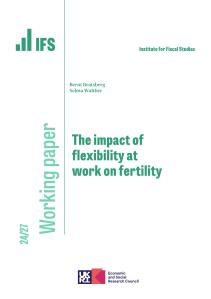The number of people with long COVID (defined as reporting symptoms more than four weeks after infection) has been on the rise – with the latest ONS figures showing that there were almost 2 million people with the condition as of May 2022, around double the number a year before.
New IFS research shows that having long COVID causes one in ten sufferers who were in work to stop work while they have the condition. It is likely that around 110,000 people are missing from work at any one time as a result of long COVID (i.e. working no hours at all, generally because they are on sick leave), at a cost of almost £1.5 billion in lost earnings per year. The research also finds that those who were less well off before the pandemic are more likely to suffer from long COVID.
By examining how outcomes have changed since before the pandemic for long COVID sufferers and similar individuals without the condition, the research shows that:
- Current levels of long COVID could be causing 110,000 workers to be missing from the labour market, i.e. working no hours at all. The vast majority of them are likely to be on sick leave, rather than losing their job entirely.
- On average, those who stop work because of long COVID are losing £1,100 per month in earnings. Across the country this adds up to almost £1.5 billion per year.
- Compared to those without long COVID, those who are suffering from the condition were, pre-pandemic, more likely to be claiming benefits (41% versus 28%), be in poverty (25% versus 19%) and live in social housing (25% versus 17%). While previous research has shown that women, those with pre-existing medical conditions and those in poorer parts of the country were more likely to be hit, this is the first evidence showing that long COVID is more prevalent among deprived individuals.
- Long COVID’s effects are quite persistent, with evidence of sufferers still missing from work at least three months after infection, though by the six-month mark the effects are considerably smaller and most have returned to work.
Tom Wernham, a Research Economist at IFS and an author of the report, said:
‘Though acute COVID is no longer the severe threat to public health and the economy that it once was, the impact of long COVID has continued to grow over time, with almost 2 million now suffering from the condition. Our research suggests that for a significant minority of long COVID sufferers, the condition has severe effects not only on their health but on their ability to do paid work. The rising rate of long COVID could therefore put additional strain on families during the cost of living crisis, especially as long COVID is more common among poorer families, as well as drag on a struggling economy – we estimate there are 110,000 workers missing from work as a result.’










